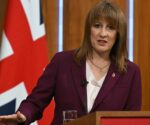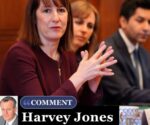£114 Black Friday shopping warning issued to millions | Personal Finance | Finance
Brits are being urged to think twice this Black Friday as charities report record numbers seeking help with debt.
UK Finance says the average BNPL transaction is £114, with fashion purchases – including clothes, shoes and jewellery – making up nearly half of all spending on the platforms.
Billions of pounds are expected to be spent online and in stores over the discount weekend, with more than one in three shoppers planning to rely on BNPL to stagger their festive spending.
But consumer groups say the easy credit option – now plastered across checkout pages and increasingly on high streets – is leading to a surge in people falling behind on repayments.
Citizens Advice said it was helping “more people than ever before” with BNPL-related problems, warning that shoppers already struggling with bills should be especially cautious.
Money Wellness, a free debt advice provider, said last month was its busiest ever for BNPL cases, with a further spike expected in January and February once festive purchases start coming due.
Industry data shows the rapid spread of the payment method, used by 25% of adults last year – up from 14% in just twelve months.
Shoppers are using it for everything from clothes and trainers to takeaway pizzas and hotel stays, often splitting the cost into three or four instalments.
As long as payments are made on time, no interest is charged. But missed payments can trigger fees, damage credit scores and even lead to debt collectors being involved.
More than three million BNPL customers missed payments last year, according to the latest figures, underscoring growing concern that households are taking on credit they cannot manage as living costs remain high.
With Black Friday on November 28, Cyber Monday on December 1 the final Christmas rush to follow, it marks the busiest period of the year for leading BNPL firms Klarna, Clearpay and PayPal.
PwC forecasts UK consumers will spend £6.4 billion over Black Friday weekend alone, slightly up on last year.
Jane Parsons of Citizens Advice said BNPL had morphed from a niche option into “a quick solution for people wanting to bag the latest bargains,” but warned it was still borrowing and “could still deal a heavy blow to your budget, with little protection if things go wrong”.
Vikki Brownridge of StepChange echoed the concerns, saying that while the services are often interest-free, “it’s certainly not risk-free”.
Sebrina McCullough of Money Wellness said many people are overwhelmed by “juggling multiple BNPL payments alongside rent, bills and other debts,” adding that the biggest issue is consumers holding several BNPL accounts with different payment dates.
She told the Guardian: “Missed or late payments often come with fees, and debt can spiral before people realise.”
Long-awaited safeguards are coming – but not yet. The Financial Conduct Authority will begin regulating BNPL from 15 July 2026. Lenders will have to carry out affordability checks, even on small purchases.









